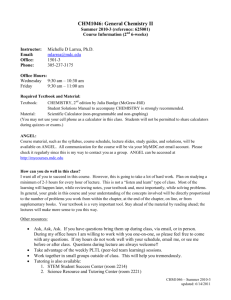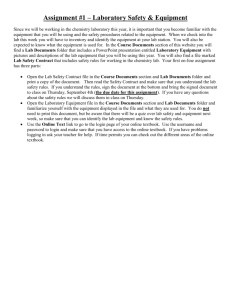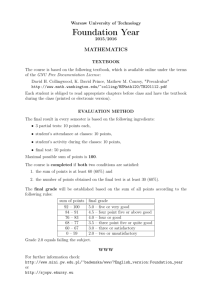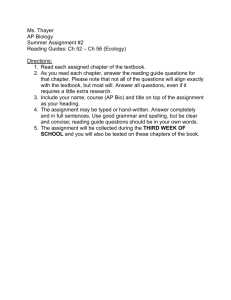Syllabus - East
advertisement
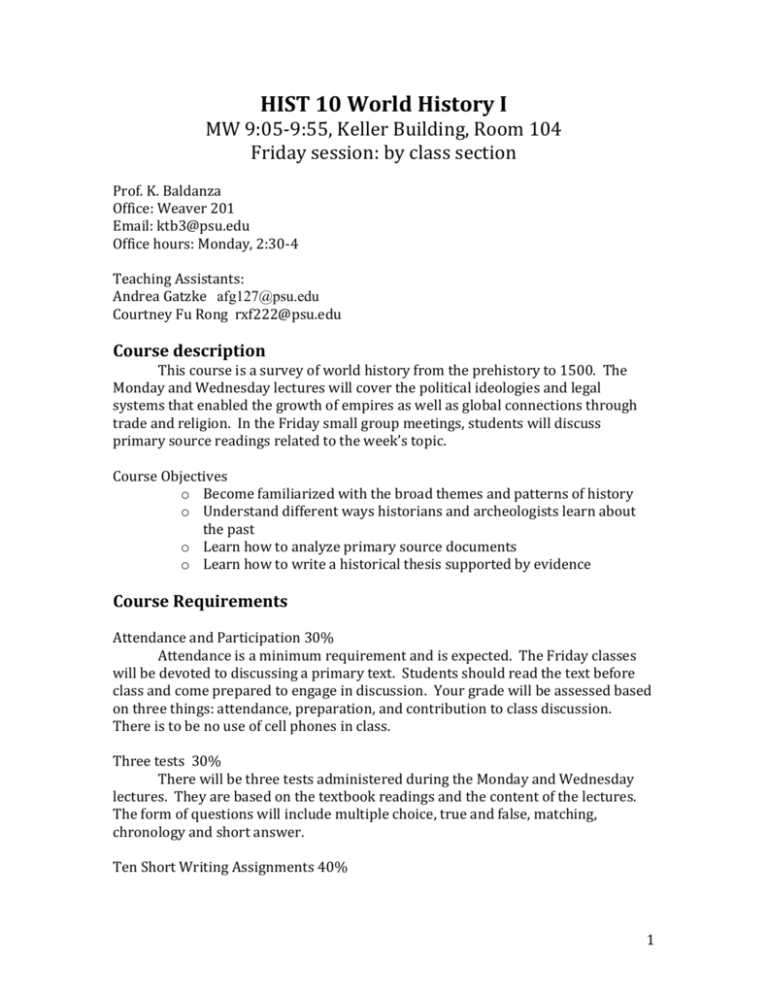
HIST 10 World History I MW 9:05-9:55, Keller Building, Room 104 Friday session: by class section Prof. K. Baldanza Office: Weaver 201 Email: ktb3@psu.edu Office hours: Monday, 2:30-4 Teaching Assistants: Andrea Gatzke afg127@psu.edu Courtney Fu Rong rxf222@psu.edu Course description This course is a survey of world history from the prehistory to 1500. The Monday and Wednesday lectures will cover the political ideologies and legal systems that enabled the growth of empires as well as global connections through trade and religion. In the Friday small group meetings, students will discuss primary source readings related to the week’s topic. Course Objectives o Become familiarized with the broad themes and patterns of history o Understand different ways historians and archeologists learn about the past o Learn how to analyze primary source documents o Learn how to write a historical thesis supported by evidence Course Requirements Attendance and Participation 30% Attendance is a minimum requirement and is expected. The Friday classes will be devoted to discussing a primary text. Students should read the text before class and come prepared to engage in discussion. Your grade will be assessed based on three things: attendance, preparation, and contribution to class discussion. There is to be no use of cell phones in class. Three tests 30% There will be three tests administered during the Monday and Wednesday lectures. They are based on the textbook readings and the content of the lectures. The form of questions will include multiple choice, true and false, matching, chronology and short answer. Ten Short Writing Assignments 40% 1 Starting from the second week of class, students are required to post brief essays (approximately three paragraphs) on the primary source readings on the Angel website. They are to be posted by 10 PM on the Thursday night before class. These responses will be graded as check plus for excellent work, check for satisfactory work, check minus for unsatisfactory work, and a zero for failure to submit. Your answers will be viewable by your classmates, and you may use the Angel forum to respond to your classmates’ writing. Although brief, your responses should demonstrate that you have thought carefully about the text and be written in clear, grammatical and complete sentences. Most importantly, your short essay should have a thesis statement (argument) supported by evidence from the text. Essays that simply summarize or comment on the text will be graded as unsatisfactory. Late work will not be accepted. Thirteen writing assignments are marked on the syllabus, but you will only be graded for ten. That means you may select which ten you would like to write about. If you submit more than ten, your grade will be based on the ten best scores. Penn State Academic Integrity Policy Penn State defines academic integrity as the pursuit of scholarly activity in an open, honest and responsible manner. All students should act with personal integrity, respect other students’ dignity, rights and property, and help create and maintain an environment in which all can succeed through the fruits of their efforts (Faculty Senate Policy 49-20). Dishonesty of any kind will not be tolerated in this course. Dishonesty includes, but is not limited to, cheating, plagiarizing, fabricating information or citations, facilitating acts of academic dishonesty by others, having unauthorized possession of examinations, submitting work of another person or work previously used without informing the instructor, or tampering with the academic work of other students. Students who are found to be dishonest will receive academic sanctions and will be reported to the University’s Judicial Affairs office for possible further disciplinary sanction. Plagiarism (representing another person’s work as your own) is unacceptable. In cases of plagiarism, students will be failed for that assignment. No outside research is expected for this course. When citing, paraphrasing, or quoting from the assigned texts, be sure include the author and page number. If you are unsure about what counts as plagiarism or how to cite sources, talk to the professor or TAs. I encourage students to discuss the class and assignments outside of class, but all written assignments and tests are to be the independent work of each individual student. Course Materials Textbook Worlds Together, Worlds Apart: A History of the World: Beginnings through the Fifteenth Century (Third edition) (Volume 1) Primary source readings will be available on the Angel course website Week One: Creation Stories and the Spread of Humans 8/22 and 8/24: Textbook reading: Pages 5-41 8/26: No primary source reading or writing assignment this week 2 Week Two: Egypt and Mesopotamia 8/29 and 8/31: Textbook reading: pages 43-69 and 91-100 9/2: Primary source reading: The Code of Hammurabi and Ancient Egypt Writing assignment due on Angel by Thursday, September 1, 10 PM Week Three: Early China 9/7: Textbook reading: pages 71-75; 106-110; 152-172; and 242-259 9/9: Primary Source reading: Confucianism and its Legacy and The Salt and Iron Debate Writing assignment due on Angel by Thursday 10 PM Week Four: the Hellenic World 9/12 and 9/14: Textbook reading: pages 190-215 9/16: Primary source reading: Plato, The Apology Writing assignment due on Angel Thursday before class Week Five: The Roman Empire 9/19 and 9/21: Textbook reading: pages 261-296 9/23: Primary Source reading: Pliny the Younger and Trajan, Exchange on Prosecuting Christians Writing assignment due on Angel Thursday before class Week Six: The Pacific World 9/26: In class test 9/28: Textbook readings: page 111-113 9/30: View in class: Wayfarers: A Pacific Odyssey No writing assignment this week Week Seven: India 10/3 and 10/5: Textbook reading: pages 147-150; 173-177; 216-223; 378-380 10/7: Primary source reading: selection from the Rig Veda, Upanishads, and Asoka: Three Edicts Writing assignment due on Angel Thursday before class Week Eight: Africa 10/10 and 10/12: Textbook reading: pages 187-190; 310-312; 369-373 10/14: Primary source reading: Axum and the World 3 Writing assignment due on Angel Thursday before class Week Nine: the Americas 10/17 and 10/19:Textbook reading: pages 182-183; 312; 396-7 10/21: Primary source reading: 1. Spanish Conquest of Native America and Aztec Accounts of the Conquest of Mexico http://www.fordham.edu/Halsall/mod/aztecs1.asp 2. Cortes’ Letter to Charles V, http://www.fordham.edu/Halsall/mod/1520cortes.asp Writing assignment due on Angel Thursday before class Week Ten: Buddhism 10/24-10/16: Textbook reading: pages 224-227; 303-305 10/28: Primary Source reading: The Buddha, Sermons and Teaching and Han Yu, Memorial on the Bone of the Buddha Writing assignment due on Angel Thursday before class Week Eleven: the Silk Road 10/31 and 11/2: Textbook reading: pages 228-336; 299-302 11/4: Primary Sources: Traveler’s Tales: Xuanzang in India, Marco Polo in China, and Ibn Battuta in Africa Writing assignment due on Angel Thursday before class Week Twelve: Southeast Asia 11/7: Textbook: 386-389 11/9: In class Test 11/11: Primary Source Reading: A Record of Cambodia (this reading is 60 pages long – start reading early!) Writing assignment due on Angel Thursday before class Week Thirteen: Islam 11/14 and 11/16: Textbook reading: pages 323-338; 374-378; 417-425 11/18: Primary source readings: Voices of Islam Writing assignment due on Angel Thursday before class Thanksgiving Break Week Fourteen: the Mongol World Empire 11/28-11/30: Textbook reading: pages 340-358; 401-409 4 12/2: Primary source reading: Perspectives on the Mongols Writing assignment due on Angel Thursday before class Week Fifteen: China and the World 12/5 and 12/7: Textbook reading: pages 436-441 12/9: Primary source reading: Sailing to Calicut: Chinese and Portuguese Voyages Writing assignment due on Angel Thursday before class Final Exam: Time and place to be announced 5
